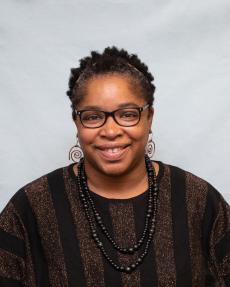Chaplain: Sakinah Nicholson-Carter
Watch Sakinah's employee spotlight story here:
Sakinah Nicholson-Carter's Story
Chaplain Sakinah Nicholson-Carter has been a spiritual counselor for the Hospice of Washington County for the last three years. In her six years of hospice experience, she has connected with and given support to many patients and families. "When looking at hospice as a whole, it's an amazing organization. It's an amazing resource for the community and a service that we give to our patients."
Role in hospice
Sakinah connects with patients over the phone and in person. She listens to their stories, helps them work through emotions and offers stability during a particularly stressful time in their lives. "When I do visit with patients, I like to get people's story. I want to hear, what was your childhood like? What kind of job did you have?" says Sakinah. "I also try to pinpoint the legacy that the patient is leaving with either the children, the grandchildren or other family members."
For Sakinah, the most prominent part of her role as a spiritual counselor is validating her patients as well as their caregivers. "A lot of family members discuss how they're overwhelmed, how they didn't expect it to be like this. I try to connect with them, validate how they're feeling, make sure that they know that what they're feeling is not abnormal."
Connecting with patients
While Sakinah offers spiritual and religious support, she also stresses the importance of relating to patients individually. "Being able to connect with people on a level that they don't see really as a spiritual level, it kind of opens the door for them to feel comfortable to talk to me."
Sakinah has connected with patients over a wide variety of topics. "I have a patient whose son is really into Star Wars and really into superheroes. That's something that I've been able to connect with him about. I had one patient who was a literature major, and so we sat and reread old literature and she really, really enjoyed that."
Sakinah also enjoys singing with patients. "They love Elvis," she laughs. "I find that gratifying, just kind of connecting with them on a musical level."
Pursuing Hospice Chaplaincy
Sakinah earned a Masters of Divinity. After graduating from seminary, Sakinah completed several units of clinical pastoral education. She worked as a pediatric chaplain for a year and as a chaplain for Durham VA Health Care System for another year. After her residencies, she had trouble finding a job. "It was just a really weird experience," Sakinah recalls. Though she got callbacks, she had trouble securing a position.
"Then somebody told me to abbreviate my name, because my name was too ethnic for me to get the call back that I needed. I said, 'No, I'm not gonna do that.' And then I got a call from a rabbi. The Rabbi called me here because he understood the meaning of my name. Sakinah, in Hebrew, comes from the word Shekinah, which means the Divine Feminine Presence of God. He hadn’t met a Sakinah, and wanted to see if the person was capable of living up to the name. I am NOT capable. Just honored to represent God in a different light to others.I don't know how he got my resume. So I came up here, I interviewed with him, it went great and that's how I ended up here in Maryland."
History and family
Sakinah was born in Chicago but grew up in Washington D.C.. Her schooling took her to North Carolina for her undergraduate degree and Virginia for graduate school. She moved back to North Carolina and also lived in Maryland for a time. She currently resides in West Virginia, though she hopes to return to Maryland sometime soon.
In her free time, Sakinah enjoys meditating and taking time to reflect. She and her husband of 13 years have three children. Spending time with her family is important to Sakinah. "I like figuring out stuff to do with my kids since they're getting older. I want to connect with them so that once those really hard teenage years come and they kind of turn away, which is normal, I want them to feel comfortable still coming to talk to me."

